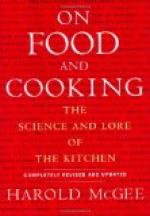Cornaro lived to be one hundred years old, doubtless owing largely to his simple, frugal habits.
DIET FOR THE YOUNG.
A very large share of the mortality among young children results from dietetic errors which proper knowledge and care on the part of those who have them in charge might commonly avoid. From infancy to the age of twelve or eighteen months, milk is the natural and proper food. Milk contains all the food elements except starch, which cannot be digested by very young children, owing to the insufficient formation of digestive elements of the salivary secretion during the first few months. If the child is deprived of the milk provided by nature, the best artificial food is cow’s milk; it, however, requires very careful selection and intelligent preparation. The animal from which the milk comes, should be perfectly healthy and well cared for. The quality of her food should also receive attention, as there is little doubt that disease is often communicated to infants by milk from cows improperly fed and cared for. An eminent medical authority offers the following important points on this subject:—
“The cow selected for providing the food for an infant should be between the ages of four and ten years, of mild disposition, and one which has been giving milk from four to eight weeks. She should be fed on good, clean grain, and hay free from must. Roots, if any are fed, should be of good quality, and she should have plenty of good clean water from a living spring or well. Her pasture should be timothy grass or native grass free from weeds; clover alone is bad. She should be cleaned and cared for like a carriage horse, and milked twice a day by the same person and at the same time. Some cows are unfit by nature for feeding infants.”
Milk from the same animal should be used if possible. Changing from one cow’s milk to another, or the use of such milk as is usually supplied by city milkmen, often occasions serious results. The extraction of the heat from the milk immediately after milking and before it is used or carried far, especially in hot weather, is essential. While the milk itself should be clean and pure, it should also be perfectly fresh and without any trace of decomposition. To insure all these requisites, besides great care in its selection, it must be sterilized, and if not intended for immediate use, bottled and kept in a cool place until needed. It is not safe to feed young children upon unsterilized milk that has stood a few hours. Even fresh milk from the cleanest cows, unless drawn into bottles and sealed at once, contains many germs. These little organisms, the cause of fermentation and decomposition, multiply very rapidly in milk, and as they increase, dangers from the use of the milk increase.
There is no doubt that cholera infantum and other digestive disturbances common among young children would be greatly lessened by the use of properly sterilized milk. Directions for sterilizing milk, and additional suggestions respecting points to be considered in its selection, are to be found in the chapter on Milk, etc.




